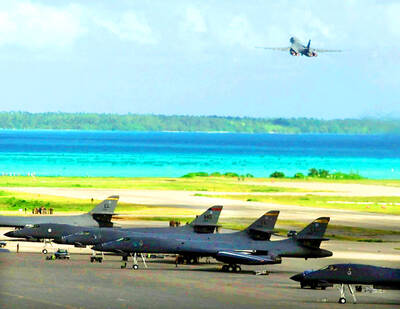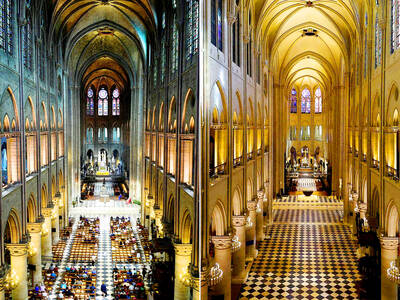The leaders of Cyprus' rival Greek and Turkish Cypriot communities were to meet yesterday to try to clear up disagreements that have strained attempts to reunify the ethnically divided island.
Cyprus President Dimitris Christofias and Turkish Cypriot leader Mehmet Ali Talat agreed in March to restart long-stalled reunification talks. Christofias’ election in February, replacing a hardliner, rekindled hopes that the decades-old division of Cyprus could finally be resolved.
But the initial optimism has been replaced by concern, with Greek Cypriots worried about the lack of progress ahead of the scheduled start of direct negotiations between Talat and Christofias late next month.
In his meeting with Talat, Christofias was to seek reassurances that the Turkish Cypriots and Turkey are not aiming for a two-state settlement that would formally split the island instead of the long-standing agreement for a loose bi-zonal, bi-communal federation.
Such fears among Greek Cypriots stem from an April 24 statement by Turkey’s National Security Council referring to a solution “based on the realities on the island and on the existence of two separate peoples and two democracies.”
Cyprus has been split along ethnic lines since 1974, when Turkey invaded in response to an abortive coup by supporters of union with Greece. More than three decades of negotiations have failed to produce a lasting result.
In a bid to ensure these negotiations are successful, working groups from the two sides have been trying to narrow differences before next month’s talks. In their meeting, Christofias and Talat were to review what progress they had made.
The Cyprus government has complained of a lack of progress, especially on the more contentious issues such as security, and has said direct negotiations between the two leaders cannot start without some positive movement.
But Talat has said direct talks will begin next month regardless of whether they have made headway, unless one side backs out.
On Thursday, Talat’s spokesman Hasan Ercakica said “it would be wrong” to claim that no progress has been made. He dismissed a two-state solution and reiterated Turkish Cypriot support for a federated Cyprus.
Another sticking point so far has been whether any new peace deal would be modeled on a UN plan that Turkish Cypriots accepted but Greek Cypriots rejected in 2004.
Hubert Faustmann, a political analyst, said the government interprets a perceived lack of progress as Turkish and Turkish Cypriot unwillingness to shift away from the UN blueprint.
Greek Cypriots saw the plan as compromising their security by granting Turkey intervention rights and a permanent military presence on the island.
“The question now is how willing are the Turkish Cypriots to move away from the [UN] plan ... Are they willing to renegotiate a deal?” said Faustmann, a political science professor at Nicosia University.

South Korean President Yoon Suk Yeol on Tuesday declared martial law in an unannounced late night address broadcast live on YTN television. Yoon said he had no choice but to resort to such a measure in order to safeguard free and constitutional order, saying opposition parties have taken hostage of the parliamentary process to throw the country into a crisis. "I declare martial law to protect the free Republic of Korea from the threat of North Korean communist forces, to eradicate the despicable pro-North Korean anti-state forces that are plundering the freedom and happiness of our people, and to protect the free

CHAGOS ISLANDS: Recently elected Mauritian Prime Minister Navin Ramgoolam told lawmakers that the contents of negotiations are ‘unknown’ to the government Mauritius’ new prime minister ordered an independent review of a deal with the UK involving a strategically important US-UK military base in the Indian Ocean, placing the agreement under fresh scrutiny. Under a pact signed last month, the UK ceded sovereignty of the Chagos archipelago to Mauritius, while retaining control of Diego Garcia — the island where the base is situated. The deal was signed by then-Mauritian prime minister Pravind Jugnauth and British Prime Minister Keir Starmer on Oct. 3 — a month before elections in Mauritius in which Navin Ramgoolam became premier. “I have asked for an independent review of the

France on Friday showed off to the world the gleaming restored interior of Notre-Dame cathedral, a week before the 850-year-old medieval edifice reopens following painstaking restoration after the devastating 2019 fire. French President Emmanuel Macron conducted an inspection of the restoration, broadcast live on television, saying workers had done the “impossible” by healing a “national wound” after the fire on April 19, 2019. While every effort has been made to remain faithful to the original look of the cathedral, an international team of designers and architects have created a luminous space that has an immediate impact on the visitor. The floor shimmers and

‘VIOLATIONS OF DISCIPLINE’: Miao Hua has come up through the political department in the military and he was already fairly senior before Xi Jinping came to power in 2012 A member of China’s powerful Central Military Commission has been suspended and put under investigation, the Chinese Ministry of National Defense said on Thursday. Miao Hua (苗華) was director of the political work department on the commission, which oversees the People’s Liberation Army (PLA), the world’s largest standing military. He was one of five members of the commission in addition to its leader, Chinese President Xi Jinping (習近平). Ministry spokesman Colonel Wu Qian (吳謙) said Miao is under investigation for “serious violations of discipline,” which usually alludes to corruption. It is the third recent major shakeup for China’s defense establishment. China in June